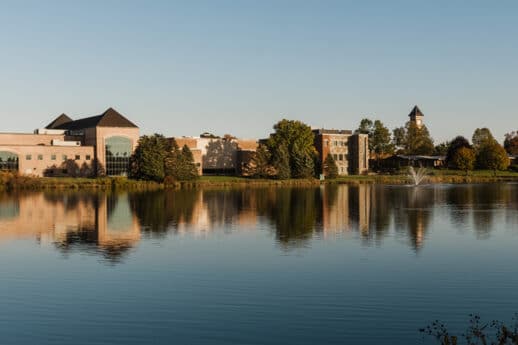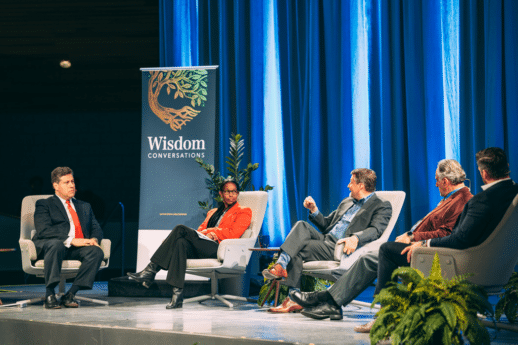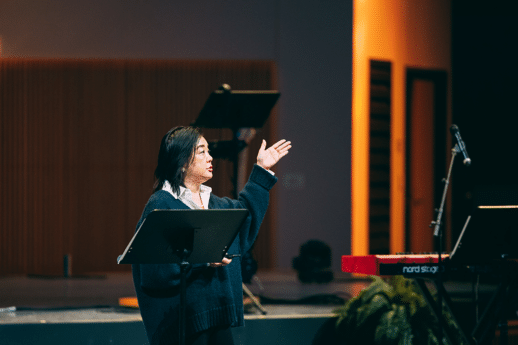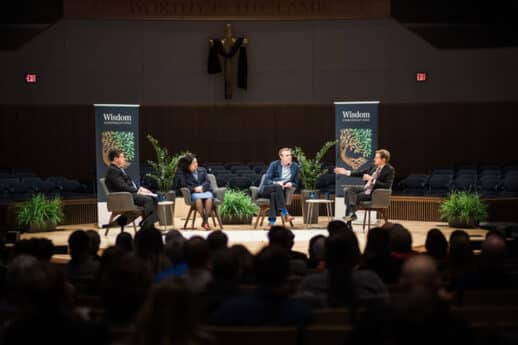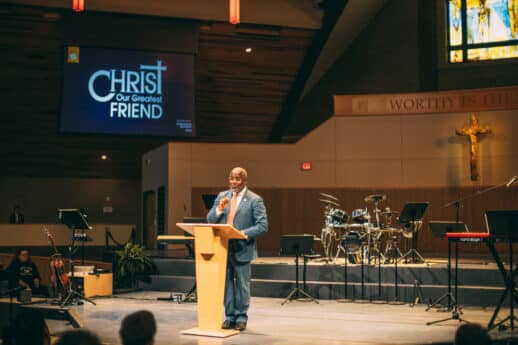From Deconstruction to Revival: Wisdom Conversations Ignites a Powerful Dialogue on Campus
Disappointing statistics. Concerning reports. Disheartening projections. At the fourth installment of Cornerstone University’s Wisdom Conversations, the research presented regarding Christianity in America was not hopeful.
But in the midst of a conversation about deconstruction, cultural conflict and division within the church, the gospel prevailed.
It was not a spirit of fear that took over Christ Chapel on Oct. 5, but a spirit of radical hope and confidence. Three esteemed panelists — pastor Tara Beth Leach, political commentator Derryck Green, and writer and thought leader Eric Metaxas — joined with university president Dr. Gerson Moreno-Riaño to discuss “Christianity in America: Declining Toward Insignificance or Resurging Toward Revival?” Over 1,000 people registered and attended the sold-out event.
This conversation revolved around the idea of where Christianity in our country is headed. The United States has seen two great revivals, or “awakenings,” in its history, both at crucial times in our culture. And in a post-pandemic era that has spawned racial division, mental health crises and global strife, revival could not come at a better time.
In America, Religion Is At An All-Time Low
A 2019 report from the Pew Research Center showed that across all U.S. demographics, Christianity in America is on the decline. Within a decade, Americans identifying as Christians declined by 12%. In the same period, religious “nones” — those who prescribe to no religion whatsoever — increased by 10%.
A 2022 follow-up of this report examined what Christianity in America may look like if these trends continue for the next 50 years. By 2070, Christians may only make up about 37% of America’s population, whereas in 2022 this number was at 64%.
An interesting finding in this 2022 study was the phenomena of “switching,” better known as “deconstructing” in popular culture. In the last decade, prominent faith leaders and influencers have publicly deconstructed, from American singer-songwriter Michael Gungor to Abraham Piper, son of Reformed preacher John Piper. Popular YouTube stars, TikTokers, and other prominent figures have also left the church — and done so publicly, announcing their deconstruction to their fans.
For Gen Z, whose lives are spent primarily on the internet, this trend can be detrimental to growing faith.
In the Oct. 5 conversation, the topic of deconstruction was revisited time and again. It was a worthwhile conversation to have on a Christian college campus, where Gen Z is currently training and preparing to be influencers for Christ in a grim-looking world.
“Christian influencers who are untethered to a local church are publicly going through crises of faith—and taking generations with them,” said Tara Beth Leach, pastor at Good Shepherd Church in Naperville, Ill., during the conversation. As a Millennial pastor, she has a deep concern for the next generation and their faith, especially Gen Z women.
Derryck Green, member of Project 21, a national leadership network of Black conservatives, observed that Gen Z takes to social media before their Bible for answers to questions.
“Gen Z does not read their Bible,” said Green. “They ask people on YouTube what they think.”
Of all social media usage among Gen Z, YouTube is the most-used website. According to a Morning Consult survey, 88% of Gen Z’s time is spent on YouTube, followed closely by Instagram and TikTok.
A brief search of “The Bible” on YouTube nets pages of results with titles such as “Yes, the Bible supports slavery,” “Why the Book of Enoch was forbidden in the Bible,” and “The Bible and the Book of Mormon are in harmony.” By watching these videos and having no Scriptural understanding of these claims, it’s easy for Gen Z to be led astray by influencers they admire.
“Deconstruction is deformation away from the image of Christ,” Leach said. “Gen Z is confused by influencers. They need the same hunger for God’s Word.”
Faith and the Transmission of Values
So what can be done about the crisis of faith Gen Z is facing? In his opening remarks, Moreno-Riaño pointed out another finding of the Pew Research study — parents are not transmitting Biblical values to their children.
This isn’t necessarily because parents don’t want to teach the Bible. They may not be equipped to answer their child’s questions. They may think the Bible is too difficult for their young children to grasp. Or they may simply think dropping their child off at Sunday school is enough. None of these are signs of a bad, un-Christian parent — merely an ill-equipped one.
Moreno-Riaño walked this finding a step further. Perhaps this gap is also because churches are not transmitting values to their congregation. While the term “culture war” has become something of a buzzword in Christian circles, it is a reality inside and outside the church. Christians are hungry for answers to deep, cultural questions — What should I, as a Christian, think about CRT? How do I react if my child wants to change his gender? How do I respond to a neighbor who believes my views are hateful?
“The church has to be an alternative society,” Leach said. “In a world of misery and squalor, the church is an island of mercy.”
Christians want their church to shepherd them and answer their questions, not remain ungrounded on cultural issues. Green has observed that many churches in 2023 are falling prey to syncretism — Christian worldview within churches being woven into a “patchwork” of secular ones.
“Churches don’t want to engage in cultural topics because they’re afraid they will cause disruptions in the Body of Christ,” Green noted.
Eric Metaxas, author of biographies for giants of the faith including William Wilberforce and Dietrich Bonhoeffer, was even more staunch in his view.
“Church is not about marketing a product, and neither should it try to be relevant,” Metaxas said. “Don’t bend to culture. True relevance takes guts. Do pastors want to disciple their church or simply fill the pews? We have to be clear and daring about discussing these issues — while doing so in love.”
As a university in this climate, Cornerstone stands at a unique cultural crux. While other universities have decided to fall away from Biblical values and embrace cultural ones, Cornerstone has taken its stance — that the Word of God is the only truth that is infallible, and it is truth worth defending in a way that is confrontational, but not aggressive.
“Jesus was love and truth. And he flipped tables,” Metaxas said. “We have a basis to explain why things are right and wrong.”
The Hope of Revival
While the statistics seem grim and the future feels uncertain, hope still remains. Amidst the findings of the Pew Research Study, Moreno-Riaño also noted three key revivals across the country. On February 8, 2023, a typical chapel service at Asbury Seminary in Wilmore, Ken., transformed into a weeks-long worship outpouring. This outpouring attracted the attention of national and international news media. Travelers came from as far as Japan and Russia to be part of it. According to Asbury’s website, “The LORD continues to move across the Wilmore community, Kentucky, the United States, and the world.”
Then, on February 24, 2023 — ironically, the day after the Asbury Outpouring concluded — Christians gathered across the United States for the Collegiate Day of Prayer. On the event’s 200th anniversary, thousands of individuals and organizations across the country adopted one of our nation’s over 4,000 college campuses to pray for the outpouring of God’s spirit on campus.
Lastly, on September 12, 2023, over 200 students at Auburn University were baptized following a night of worship at Neville Arena. One student said that although he’d seen Auburn’s football team beat Kentucky and Alabama, “I have never seen something like I did Tuesday night.”
“As the students go, so goes our nation,” Moreno-Riaño said of these phenomena.
Despite reports of dwindling and deconstructing faith, the hope of the LORD remains. Metaxas said it best during the evening: “The trends don’t matter. God makes all things work together for good. We are seeing revival happening because of how bad it is out there.”
The challenge of the evening was just that — to have hope. To be revived within our own hearts. To be in God’s Word and use that word to be a light in the world. And to not live in despair, wringing our hands at the state of things, but to live in radical hope for this world and the next.
What’s Next?
The conversation on October 5 did not end in Christ Chapel.
“I think Wisdom Conversations is a great thing to do in our community,” said one student after the presentation. “There are over a thousand people here. This is really reaching people.”
Michael Pasquale, Ph.D., dean of the School of Ministry, Media & the Arts and director of the Logos Center on campus, is excited that these conversations will continue on Cornerstone’s campus. He said conversations were happening as soon as the day after the event.
“After the conference, the faculty and staff held a time of discussion to talk through the highlights,” Pasquale said. “We want to continue the conversations through faculty and staff summer reading and discussion.”
Wisdom Conversations has permeated the classrooms as well. As Cornerstone establishes itself as a Christian thought leader, deep and strong discussions will continue to happen among students. This past spring, faculty members even developed course material based on the March Wisdom Conversation regarding artificial intelligence. Pasquale said that the Logos Center has plans to continue this sort of curriculum development in the future.
“Our students need to be prepared to talk about and continue the conversation in our communities,” Pasquale said. “Wisdom Conversations is a great way to rally the CU community and equip us in these areas of conversation.”
Concurrently, Cornerstone also announced a new scholarship related to Wisdom Conversations. The scholarship is named in honor of Carole Bos, a longtime CU Board of Trustee member who recently retired as chair and will remain on the board. The $2,000 scholarship pays tribute to Bos’ leadership and advocacy for CU becoming a Christian thought leader.
The scholarship is available to all CU students. To apply, students must submit an essay outlining their thoughts on the Wisdom Conversations topic. The essays are reviewed by Bos and select faculty members.
The next Wisdom Conversations event will occur on March 14, 2024, and is open to the public. The upcoming event will examine “The Global Impact of American Christianity.” Register today at cornerstone.edu/wisdom-conversations.




